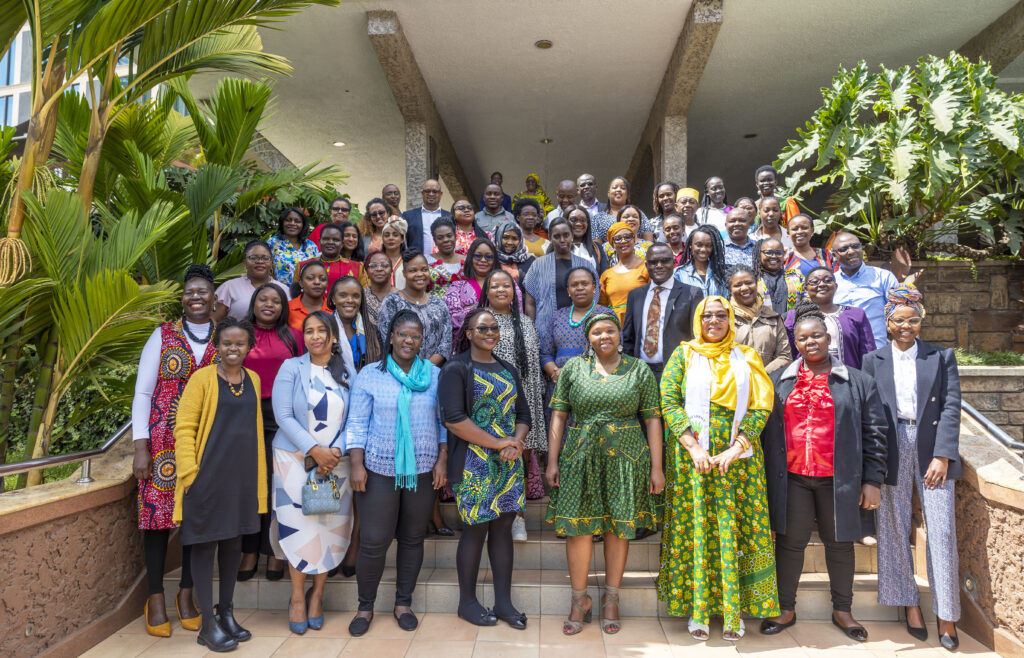August 23rd-24th, 2023, was a diverse gathering where Equality Now, in partnership with UNFPA, hosted over 50 representatives of civil society organizations, activists and experts from across 20 countries in the region for the Eastern and Southern Africa Regional CSO Forum on Child Marriage in Nairobi, Kenya. The meeting sought to facilitate the exchange of lessons and best practices on ending child marriage, focusing on CSOs’ collective power to push for the implementation of laws and policies, adoption of a multi-sectoral approach towards ending child marriage, capacity-building and development of advocacy strategies at the community, national, sub-regional and regional levels.
The convening also sought to provide inputs to the upcoming regional conferences and global dialogues being organized for the International Conference on Population and Development (ICPD30) review scheduled for 2024 and inform participants about the planned activities. The meeting also shared practices and learnings from CSOs on the progress made at the national level in addressing harmful practices with special emphasis on child marriage, recent trends and challenges.
Participants were engaged on the importance of implementing a multi-sectoral approach towards addressing child marriage and sharing learnings on the key elements and successes of a multi-sectoral approach.

What is Child Marriage?
Child marriage is a formal or informal union before the age of 18. It is a violation of children’s human rights and a form of gender-based violence that robs children of their childhood.
How does Child Marriage impact the life of a girl?
Child marriage is frequently the outcome of entrenched gender inequality, affecting girls disproportionately. Globally, child marriage is just one-sixth as common among boys as it is among girls.
Moreover, child marriage threatens the well-being of girls. Girls who marry before 18 are more likely to experience domestic violence and less likely to remain in school. They have worse economic and health outcomes than their unmarried peers, straining a country’s capacity to provide quality health and education services.
The SADC Model Law
The SADC Model Law on Eradicating Child Marriage and Protecting Children Already in Marriage defines a child as any person below the age of 18 and recognizes that child marriage violates children’s rights, including the right to education, health, and protection from harm. It calls for prohibiting child marriage, creating prevention and response mechanisms, and promoting birth registration. Other components include supporting child brides and their families and ensuring access to education and healthcare.
Therefore, for a minimum age of marriage law to be effective, it needs to be accompanied by various relevant and appropriate laws and policies that address the multi-faceted and multi-sectoral nature of child marriage both in terms of drivers and consequences in full recognition of the complexity of patriarchy and gender inequality for girls and young women.
The Solidarity Statement on Ending Child Marriage in Eastern and Southern Africa
While recognising the importance of domesticating the SADC Model Law in Southern Africa, 34 civil society organizations came together to develop a Joint Statement on Ending Child Marriage in Eastern and Southern Africa, citing key recommendations including:
- The need for harmonized laws in every country, setting the minimum age of marriage at 18 without exceptions to end child marriage.
- The need for strengthened local and regional coordination amongst CSOs working in the field of child marriage, ensuring that the work plans of CSOs and other stakeholders towards addressing child marriage align with national action plans to end child marriage.
- The need for support for long-term programming and collective action that brings together all stakeholders to change social norms that lead to behavior change.
- Partnerships, Collaboration and Movement-Building that promotes transparency and accountability.
The Solidarity Statement is available in three versions – English, French and Portuguese.